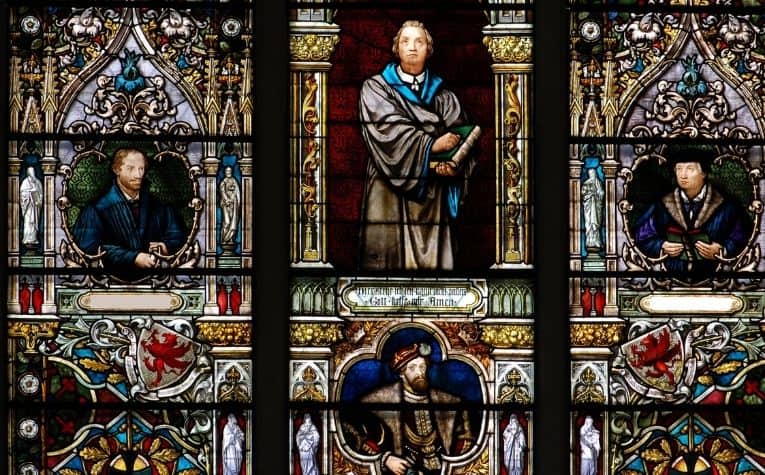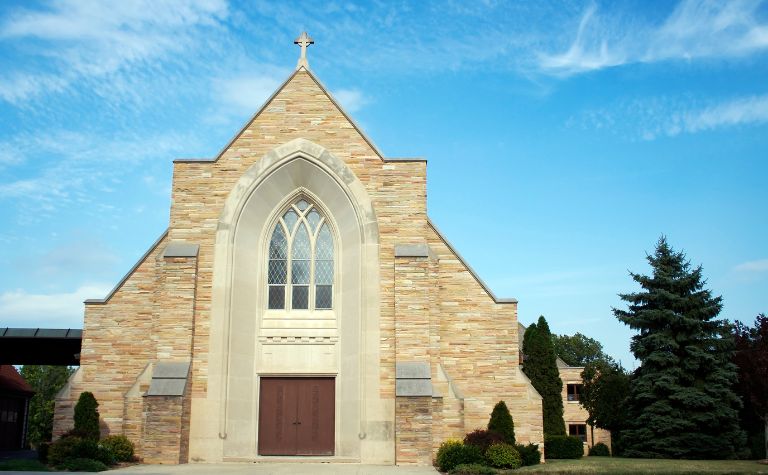The Lutheran tradition has a rich 500-year-old history. However, in the last century, some Lutheran denominations and churches have adopted liberal doctrines and practices that align more with modern society than their tradition’s history. This change has led many to wonder which Lutheran denomination is the most conservative today.
The Lutheran Church-Missouri Synod is the most prominent conservative denomination in the Lutheran tradition. The Wisconsin Evangelical Lutheran Synod, though one-fourth the size of the LCMS, is also conservative in theology and practice. Both synods have resisted progressive movements in the tradition.
What makes the LCMS and WELS conservative compared to liberal Lutheran denominations? What are some of the other Lutheran synods that are conservative or liberal? Keep reading to learn more.
Also see What Denominations Believe in Predestination? for more.

Which Lutheran Synods Are Conservative? Which Are Liberal?
There are various Lutheran synods around the world. A synod is a group of like-minded churches. The term is generally synonymous with “denomination.” (Also see Lutheran vs. Non-Denominational: What’s the Difference?)
Many countries worldwide have dozens of synods serving regions, cities, or other geographical areas. A synod may be conservative or liberal (defined below). Neighboring synods may even have different views.
Conservative Lutheran synods
| Conservative Lutheran Synods | Membership |
|---|---|
| The American Association of Lutheran Churches | 16,000 |
| Church of Australia and New Zealand | 30,000 |
| Association of Free Lutheran Churches | 41,000 |
| North American Lutheran Church | 140,000 |
| Lutheran Congregations in Mission for Christ (charismatic) | 300,000 |
| Wisconsin Evangelical Lutheran Synod | 385,000 |
| Lutheran Church-Missouri Synod | 2.2 million |
Liberal Lutheran synods
Non-conservative Lutheran synods fall on a spectrum between what they allow and what they affirm and encourage.
For example, the Evangelical Lutheran Church in America enables congregations to decide on issues like same-sex marriage and ordaining women ministers. (Also see What Do Lutherans Believe About Divorce?)
Some in the ELCA distinguish between allowing these practices and affirming and encouraging them. Critics say the ELCA’s allowances are tantamount to supporting the practices.
| Moderate-Liberal Lutheran Synods | Membership |
|---|---|
| Evangelical Lutheran Church in America | 4.2 million |
| Church of Sweden | 5.8 million |
| Church of Denmark | 4.3 million |
| Church of Iceland | 230,000 |
| Evangelical Lutheran Church in Canada | 95,000 |
The ELCA supports various ministries aimed at welcoming and affirming the LGBT community. [1]

What Makes a Lutheran Synod Conservative or Liberal?
Like other mainline Protestant traditions, the Lutheran tradition has experienced infighting over doctrine and practice that has led to division. (Also see Do Lutherans Drink Alcohol?)
The conservative branch of the tradition strives to maintain classic orthodox doctrine based on the Bible. At the same time, liberal movements try to push denominations and churches to the left side of the theological and political spectrum.
Two fundamental commitments define the contours of “conservativism”:
- The Bible is the authority for doctrine and practice: Churches yield to the Bible; the Bible doesn’t yield to churches. Denominations and churches, including their leaders, don’t determine truth, error, orthodoxy, and heresy. According to historical Lutheran teaching, the ministry of church leaders, such as minister and theologians, are only valuable and beneficial as long as they reflect the truths revealed in Scripture, which is Spirit-inspired and errorless.
- Readers must interpret the Bible literally: Bible readers should interpret Scripture literally. The Bible sometimes uses figurative and symbolic language but doesn’t allow the reader to determine arbitrarily when that occurs. For example, the reader may interpret the trees clapping their hands figuratively (Isa. 55:12) because the prophet intended the description to be understood, but readers can’t interpret the creation account (Gen. 1-2) figuratively because the author was writing a historical narrative.
The LCMS and WELS’ commitment to Scripture leads them to embrace doctrines and practices the Bible affirms and to reject alternatives. Lutheran synods that align with shifting secular worldviews and social values don’t have such a commitment to Scripture. These differences lead to division within the tradition. (Also see What Bible Translation Do Lutherans Use?)

What Issues Divide Conservative and Liberal Synods?
Disagreements within the Lutheran tradition cause synod, denomination, and church divisions. The conservatives’ commitment to Scripture and the liberals’ adherence to progressivism are irreconcilable.
Though fundamental differences in worldview and values are evident, they often find expression in individual issues like:
- Restriction and latitude regarding LGBT issues: The LCMS and WELS believe that marriage is between one man and one woman, which comes from the teachings of the Bible. However, the Evangelical Lutheran Church in America allows individual congregations to decide matters like supporting same-sex marriage and ordaining people that don’t identify as heterosexual.
- Ordination of women: Conservative Lutheran synods don’t support the ordination of women because they believe the Bible doesn’t allow it. Liberal synods ordain female ministers.
- Ecumenical worship services: Ecumenical worship services involve participation from different churches, denominations, and sometimes different religions for social and spiritual unity. Liberal Lutherans embrace such services to promote religious tolerance and social harmony. Conservative Lutherans believe participation is an expression of compromise.
- Closed communion: Conservative synods like the LCMS and the WELS don’t open the Lord’s Table to anyone but only people whose faith and lifestyle have been examined through the membership process. Liberal Lutheran churches practice “open communion” and offer anyone communion. (Note: some conservative Protestant denominations offer “open communion” because they don’t attempt to police the Lord’s Supper.)
- Creation and evolution: Conservative Lutheran synods embrace the doctrine of creation. They interpret the creation account in Genesis 1-2 and reject Darwinian evolution. Liberal Lutheran synods affirm general scientific consensus regarding the universe. This disagreement extends to issues like abortion, gender identity, and marriage, as the creation account includes those topics.
What Is Martin Luther Teach About Homosexuality?
Martin Luther taught that homosexuality is a sin. He criticized same-gender sexual activity as well as those who permitted it. Luther was especially critical of when church leadership practiced or allowed homosexual activity.
When Pope Leo X rejected the request that cardinals restrict the number of boys they kept for sexual exploitation, Luther criticized the Roman Catholic church for “openly and shamelessly the pope and the cardinals in Rome practice sodomy.”
Also, in his teaching on Sodom and Gomorrah from Genesis 19:4-5, Luther wrote: “I for my part do not enjoy dealing with this passage, because so far the ears of the Germans are innocent of and uncontaminated by this monstrous depravity; for even though disgrace, like other sins, has crept in through an ungodly soldier and a lewd merchant; still the rest of the people are unaware of what is being done in secret.”
He continues, “The Carthusian monks deserve to be hated because they were the first to bring this terrible pollution into Germany from the monasteries of Italy.”
Luther’s views aligned with those in conservative Lutheran synods today. As mentioned above, the basis for the agreement is the conviction that the Bible is the authority for doctrine and practice and that readers should understand it literally.
In this perspective, it doesn’t matter what the issue is; the Bible’s straightforward teaching on the topic is paramount: “We must make a great difference between God’s Word and the word of man. A man’s word is a little sound, that flies into the air, and soon vanishes; but the Word of God is greater than heaven and earth, yea, greater that death and hell, for it forms part of the power of God, and endures everlastingly.” Martin Luther
Please see related articles below
References:
[1] Source
[2] Source
[3] Source
Related Articles
Wondering What Denominations Are Calvinist? Here’s the Answer
The teachings of French pastor and theologian John Calvin (1509-1564) have been a significant part of the Protestant branch of the Christian faith for over 500 years. At the beginning of the 21st...
Arminianism, which is often contrasted with Calvinism, has been an influential theological belief system in Protestant Christianity for 500 years, though some aspects of it are much older. Just like...
